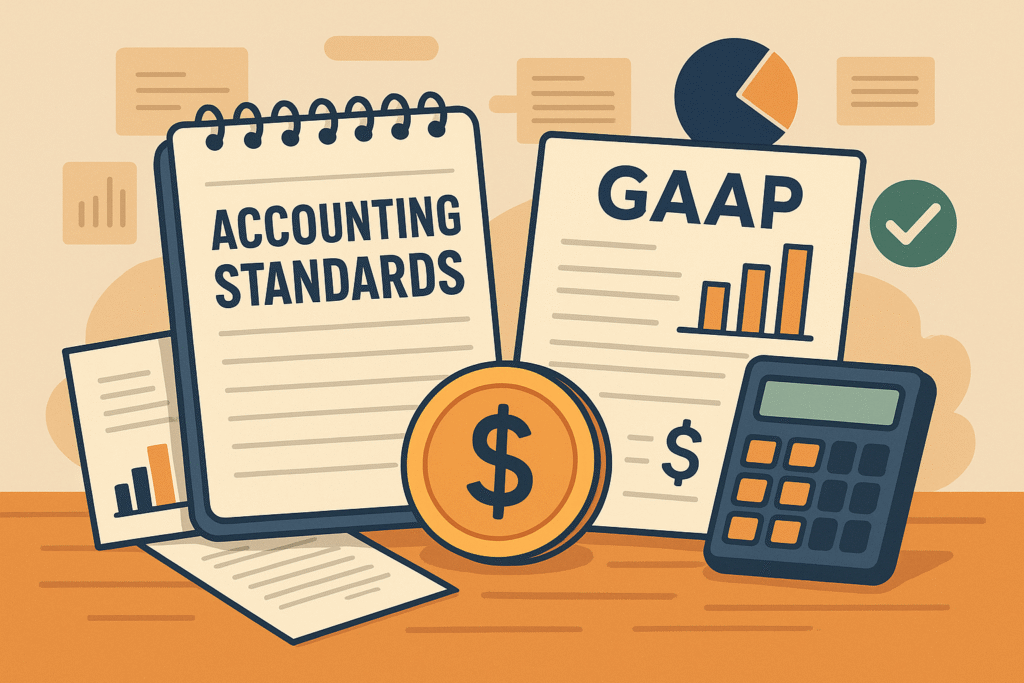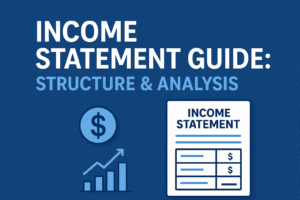In the world of finance and business, accounting standards serve as the backbone of consistency and transparency. These are formal guidelines that govern how financial transactions and economic events must be recorded, measured, presented, and disclosed in financial statements. Accounting standards ensure that the financial information of different entities can be compared accurately and reliably, regardless of their size, industry, or geographical location.
Whether you’re an investor scanning balance sheets, a regulator checking compliance, or a business owner making data-driven decisions, standardized accounting practices provide the clarity and trust necessary to operate in today’s complex global economy.
Understanding Accounting Standards
Accounting standards are developed to achieve consistency, comparability, and transparency in financial reporting. They dictate how companies should recognize revenue, record expenses, value assets and liabilities, and present overall financial health.
These standards are not mere suggestions; they are often enforced by government agencies or regulatory bodies depending on the jurisdiction. Violating them can result in penalties, legal liabilities, and reputational damage. The purpose is not only to aid internal decision-making but also to protect stakeholders such as shareholders, creditors, and tax authorities from misinformation or fraud.
Key aspects defined by accounting standards include:
- Measurement bases (historical cost, fair value)
- Recognition rules (when to record revenue/expenses)
- Disclosure requirements (what to explain in notes)
- Presentation formats (structure of financial statements)
U.S. GAAP Accounting Standards
In the United States, the official accounting framework is known as Generally Accepted Accounting Principles (GAAP). These standards are detailed and rule-based, meaning they rely heavily on precise guidelines rather than broad principles.
GAAP covers the following major areas:
- Revenue recognition
- Expense matching
- Inventory valuation (FIFO, LIFO, weighted average)
- Depreciation methods
- Lease accounting
- Financial statement presentation
For example, under GAAP, companies must use the accrual basis of accounting—recording revenues and expenses when they are earned or incurred, not when cash changes hands.
GAAP is essential for public companies in the U.S. as the Securities and Exchange Commission (SEC) requires financial statements to conform to GAAP standards.
Financial Accounting Standards Board (FASB)
The Financial Accounting Standards Board (FASB) is the independent, private-sector organization responsible for establishing and updating GAAP in the United States.
Founded in 1973, the FASB operates under the oversight of the Financial Accounting Foundation (FAF) and strives to improve transparency and reliability in financial reporting. The FASB’s standard-setting process involves:
- Identifying financial reporting issues
- Engaging public consultation and stakeholder feedback
- Issuing exposure drafts
- Finalizing new standards or updates
Key outputs from the FASB include Accounting Standards Codification (ASC) updates, which compile all authoritative GAAP guidance into a single, organized structure.
Why Are Accounting Standards Useful?
Accounting standards offer a wide range of benefits for companies, investors, regulators, and other financial stakeholders:
1. Comparability
They allow stakeholders to compare financial results across different companies or industries on a like-for-like basis.
2. Transparency
Standardized reporting reduces ambiguity and enhances the clarity of financial statements.
3. Credibility
Adherence to recognized standards boosts stakeholder trust and improves corporate reputation.
4. Regulatory Compliance
Many regulatory authorities mandate compliance with specific standards to ensure legal adherence and avoid fraudulent practices.
5. Investor Confidence
Investors are more likely to trust and invest in companies that follow established accounting principles, knowing the data they review is accurate and consistent.
What Are Generally Accepted Accounting Principles (GAAP)?
GAAP is the cornerstone of U.S. financial reporting. It is a comprehensive collection of accounting rules, standards, and procedures issued primarily by the FASB.
GAAP principles are built around several key assumptions and concepts:
- Economic Entity Assumption – Business is separate from its owners.
- Going Concern Assumption – The company will continue operating indefinitely.
- Monetary Unit Assumption – All financial data is expressed in a stable currency.
- Time Period Assumption – Financial reporting occurs over standard time intervals.
- Accrual Principle – Transactions are recorded when they occur, not when cash is received or paid.
GAAP is especially rigid and prescriptive compared to other frameworks like IFRS, often leading to highly detailed and rule-specific disclosures.
What Are International Financial Reporting Standards (IFRS)?
International Financial Reporting Standards (IFRS) are a set of globally accepted accounting principles issued by the International Accounting Standards Board (IASB). IFRS is more principle-based than GAAP, focusing on general guidelines and concepts rather than exhaustive rules.
Over 140 countries, including the UK, European Union member states, Canada, and Australia, have adopted IFRS, making it the most widely used accounting framework worldwide.
Key features of IFRS:
- Encourages professional judgment
- Focuses on substance over form
- Simpler presentation and classification rules
- Emphasizes fair value accounting in more scenarios
The goal of IFRS is to foster global consistency, allowing multinational corporations and investors to analyze financial performance across borders without confusion or discrepancies caused by differing accounting rules.
GAAP vs. IFRS: Key Differences
| Feature | GAAP (U.S.) | IFRS (International) |
| Basis | Rule-based | Principle-based |
| Developed By | FASB (Financial Accounting Standards Board) | IASB (International Accounting Standards Board) |
| Inventory Valuation | Allows LIFO, FIFO, Weighted Average | LIFO not permitted |
| Revenue Recognition | More detailed and industry-specific rules | General principles with broader flexibility |
| Development Costs | Treated as expenses | Some can be capitalized |
| Use of Fair Value | Limited use | Encouraged in asset valuation |
| Reporting Requirements | Highly detailed | Less rigid, more based on judgment |
Real-World Examples
Example 1: Revenue Recognition
A U.S.-based software company sells a 3-year software license and reports under GAAP. It must spread the revenue across the entire contract term (deferred revenue model).
However, if a company in the UK (IFRS) sells the same license, it may recognize revenue sooner if performance obligations are met up front, based on professional judgment.
Example 2: Asset Revaluation
A real estate company under IFRS in Australia may revalue its properties annually and reflect gains or losses in the financial statements.
In contrast, a U.S. company under GAAP generally holds properties at historical cost minus depreciation, even if market value increases.
Final Thoughts
Accounting standards—whether based on U.S. GAAP or international IFRS—are essential tools for maintaining integrity, trust, and order in the financial ecosystem. By ensuring consistency and transparency, they empower stakeholders to make informed decisions and reduce the risk of financial misstatements or fraud.
Understanding the role and mechanics of accounting standards is not just beneficial for accountants—it’s crucial for anyone involved in business, finance, or investment.







